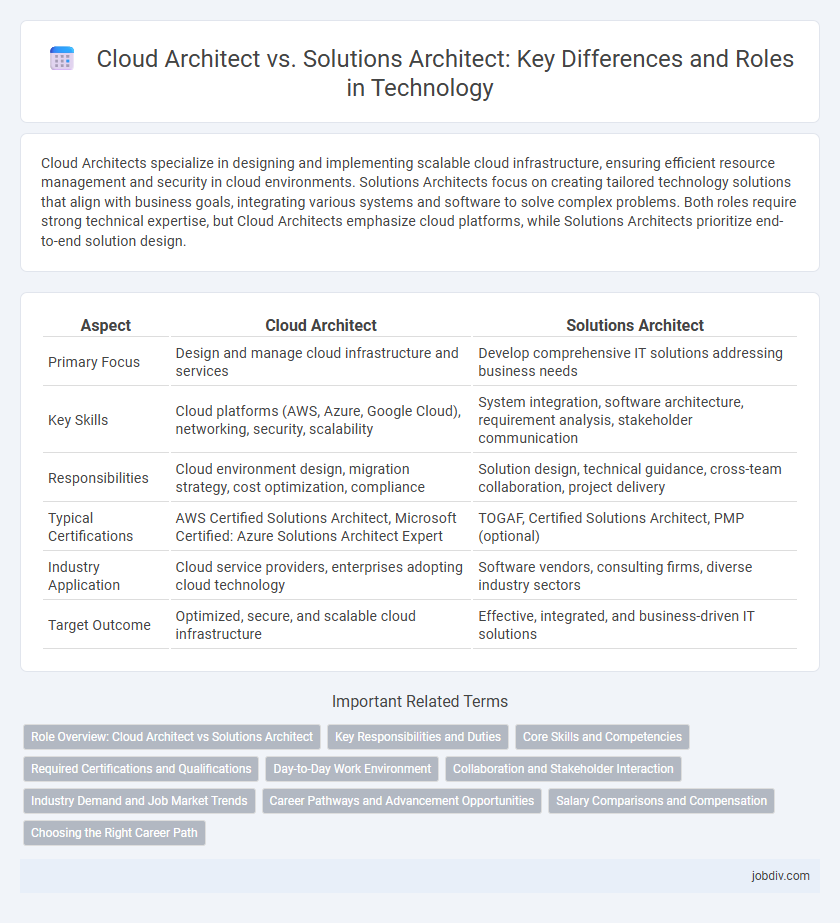Cloud Architects specialize in designing and implementing scalable cloud infrastructure, ensuring efficient resource management and security in cloud environments. Solutions Architects focus on creating tailored technology solutions that align with business goals, integrating various systems and software to solve complex problems. Both roles require strong technical expertise, but Cloud Architects emphasize cloud platforms, while Solutions Architects prioritize end-to-end solution design.
Table of Comparison
| Aspect | Cloud Architect | Solutions Architect |
|---|---|---|
| Primary Focus | Design and manage cloud infrastructure and services | Develop comprehensive IT solutions addressing business needs |
| Key Skills | Cloud platforms (AWS, Azure, Google Cloud), networking, security, scalability | System integration, software architecture, requirement analysis, stakeholder communication |
| Responsibilities | Cloud environment design, migration strategy, cost optimization, compliance | Solution design, technical guidance, cross-team collaboration, project delivery |
| Typical Certifications | AWS Certified Solutions Architect, Microsoft Certified: Azure Solutions Architect Expert | TOGAF, Certified Solutions Architect, PMP (optional) |
| Industry Application | Cloud service providers, enterprises adopting cloud technology | Software vendors, consulting firms, diverse industry sectors |
| Target Outcome | Optimized, secure, and scalable cloud infrastructure | Effective, integrated, and business-driven IT solutions |
Role Overview: Cloud Architect vs Solutions Architect
Cloud Architects design and manage scalable cloud infrastructure, ensuring seamless integration and security across platforms like AWS, Azure, and Google Cloud. Solutions Architects focus on developing comprehensive IT solutions tailored to business needs, integrating software, hardware, and cloud services to meet specific project goals. Both roles require expertise in system design, but Cloud Architects emphasize cloud environment optimization, while Solutions Architects prioritize end-to-end solution feasibility and alignment with business strategies.
Key Responsibilities and Duties
Cloud Architects design and manage scalable cloud infrastructure, ensuring optimal deployment, security, and cost-efficiency across platforms like AWS, Azure, or Google Cloud. Solutions Architects focus on creating comprehensive software solutions by integrating various technologies to meet business requirements, emphasizing system design, application architecture, and stakeholder collaboration. Both roles require expertise in cloud computing, but Cloud Architects emphasize infrastructure and platform management, while Solutions Architects prioritize end-to-end application and solution design.
Core Skills and Competencies
Cloud Architects specialize in designing scalable cloud infrastructure, requiring expertise in cloud platforms like AWS, Azure, or Google Cloud, alongside skills in networking, security, and automation. Solutions Architects focus on creating comprehensive IT solutions by integrating various technologies, emphasizing software development, business analysis, and stakeholder communication. Both roles demand strong problem-solving abilities and a deep understanding of architecture frameworks but differ in scope, with Cloud Architects concentrating on cloud environments and Solutions Architects on end-to-end system integration.
Required Certifications and Qualifications
Cloud Architects typically require certifications such as AWS Certified Solutions Architect, Microsoft Certified: Azure Solutions Architect Expert, or Google Cloud Professional Cloud Architect, emphasizing cloud platform expertise. Solutions Architects often pursue certifications like TOGAF, AWS Certified Solutions Architect, or PMP, highlighting skills in system design, project management, and business alignment. Both roles benefit from strong technical backgrounds, with Cloud Architects focusing more on cloud infrastructure, while Solutions Architects integrate broader IT solutions aligned with business objectives.
Day-to-Day Work Environment
Cloud Architects primarily design and manage scalable cloud infrastructure, optimizing service deployment across platforms like AWS, Azure, or Google Cloud. Solutions Architects focus on creating comprehensive IT strategies and integrating software solutions, collaborating closely with development teams and stakeholders. Both roles demand strong technical expertise, but Cloud Architects emphasize infrastructure automation while Solutions Architects prioritize aligning technology with business needs.
Collaboration and Stakeholder Interaction
Cloud Architects and Solutions Architects both engage extensively with stakeholders, but their collaboration differs based on project scope and technical focus. Cloud Architects primarily interact with infrastructure teams and cloud service providers to design scalable, secure cloud environments, while Solutions Architects coordinate with business stakeholders and development teams to align technical solutions with organizational goals. Effective collaboration for both roles requires clear communication and an understanding of enterprise objectives to ensure seamless integration and successful project delivery.
Industry Demand and Job Market Trends
The demand for Cloud Architects is rapidly increasing as enterprises migrate to cloud platforms like AWS, Azure, and Google Cloud, driven by the need for scalable, secure infrastructure solutions. Solutions Architects remain vital in designing tailored IT solutions across industries but face a shifting landscape as cloud-native skills become paramount. Job market trends indicate a growing premium on hybrid expertise combining cloud architecture with business-driven solution design to meet evolving digital transformation needs.
Career Pathways and Advancement Opportunities
Cloud Architects specialize in designing and managing scalable cloud infrastructures, often progressing toward roles like Cloud Engineering Manager or Chief Cloud Officer, emphasizing expertise in AWS, Azure, or Google Cloud platforms. Solutions Architects focus on creating tailored technology solutions across various environments, with career advancement leading to positions such as Enterprise Architect or CTO, requiring comprehensive understanding of business processes and software integration. Both roles offer high growth potential in the tech industry, with continuous learning in emerging technologies and certifications like AWS Certified Solutions Architect or TOGAF enhancing career trajectories.
Salary Comparisons and Compensation
Cloud Architects typically command higher salaries than Solutions Architects due to their specialized expertise in cloud infrastructure design and management, with average annual earnings ranging from $120,000 to $160,000. Solutions Architects, while versatile across various IT domains, generally earn between $100,000 and $140,000, influenced by industry and technical skill sets. Compensation packages for both roles often include bonuses, stock options, and benefits, but Cloud Architects tend to receive more substantial equity incentives tied to cloud service providers like AWS, Azure, or Google Cloud.
Choosing the Right Career Path
Cloud Architects specialize in designing and managing scalable cloud infrastructure, leveraging platforms like AWS, Azure, and Google Cloud to optimize deployment and security. Solutions Architects focus on creating comprehensive technology solutions tailored to business needs, integrating various systems and software to enhance functionality and efficiency. Prospective professionals should evaluate their interest in cloud environments versus holistic system integration when choosing between these career paths.
Cloud Architect vs Solutions Architect Infographic

 jobdiv.com
jobdiv.com